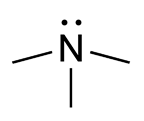
Photo from wikipedia
&NA; As a prevalent, life‐threatening and highly recurrent psychiatric illness, depression is characterized by a wide range of pathological changes; however, its etiology remains incompletely understood. Accumulating evidence supports that… Click to show full abstract
&NA; As a prevalent, life‐threatening and highly recurrent psychiatric illness, depression is characterized by a wide range of pathological changes; however, its etiology remains incompletely understood. Accumulating evidence supports that gut microbiota affects not only gastrointestinal physiology but also central nervous system (CNS) function and behavior through the microbiota‐gut‐brain axis. To assess the impact of gut microbiota on fecal metabolic phenotype in depressive conditions, an integrated approach of 16S rRNA gene sequencing combined with ultra high‐performance liquid chromatography‐mass spectrometry (UHPLC–MS) based metabolomics was performed in chronic variable stress (CVS)‐induced depression rat model. Interestingly, depression led to significant gut microbiota changes, at the phylum and genus levels in rats treated with CVS compared to controls. The relative abundances of the bacterial genera Marvinbryantia, Corynebacterium, Psychrobacter, Christensenella, Lactobacillus, Peptostreptococcaceae incertae sedis, Anaerovorax, Clostridiales incertae sedis and Coprococcus were significantly decreased, whereas Candidatus Arthromitus and Oscillibacter were markedly increased in model rats compared with normal controls. Meanwhile, distinct changes in fecal metabolic phenotype of depressive rats were also found, including lower levels of amino acids, and fatty acids, and higher amounts of bile acids, hypoxanthine and stercobilins. Moreover, there were substantial associations of perturbed gut microbiota genera with the altered fecal metabolites, especially compounds involved in the metabolism of tryptophan and bile acids. These results showed that the gut microbiota was altered in association with fecal metabolism in depressive conditions. These findings suggest that the 16S rRNA gene sequencing and LC–MS based metabolomics approach can be further applied to assess pathogenesis of depression. Graphical abstract Depression not only perturbs the gut microbiota at abundance level but that it also alters the fecal metabolic phenotype. In addition, there was a strong correlation between gut microbiota and fecal metabolites. Figure. No caption available. HighlightsA combined 16S rRNA gene sequencing and MS‐based metabolomics has been established.Depression led to significant changes of gut microbiota at phylum and genus levels.Depression led to significant changes of fecal metabolic phenotype.Strong correlation of gut microbiota, fecal metabolites, and catecholamine levels.
Journal Title: Journal of Pharmaceutical and Biomedical Analysis
Year Published: 2017
Link to full text (if available)
Share on Social Media: Sign Up to like & get
recommendations!